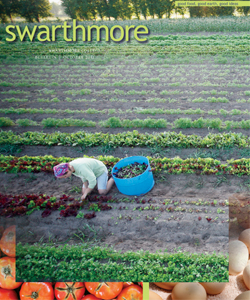By David Pacchioli
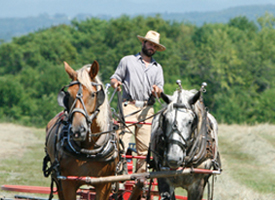
Steering carefully up the rutted driveway, I look to the house for signs of life. It’s just past the dinner hour, a rare moment of pause on a farm in midsummer. The North Country air is cool as I step from the car, and the view is east. Under the blue wash of Vermont’s distant mountains, Essex Farm’s 500 acres spread out lush and green.
Before I can turn around, Mark Guenther Kimball ’94 is bounding out to greet me, no room for doubt in his rapid stride. He is 38 but looks younger, a rangy six-foot-four, grizzled with three days’ beard. “Your timing is perfect,” he says brightly, leading me into the house. Not two minutes later, I’m sitting down to the meal he’s placed before me. It’s a simple supper, chicken and greens and a neighbor’s bread, but the freshness of the food, its plain goodness here in the farmhouse kitchen, is almost shocking after the long trip. As I sit and savor the unexpected bounty, Mark attempts to bring me up to speed.
By Mark Wallace

It was a year ago, and the end of my Saturday morning volunteer shift as a cashier at the Community Grocery Co-op, a market in Chester, Pa., a downtrodden post-industrial city of 35,000 people. The Co-op is an experiment in food democracy and sustainable living. Tina Johnson, its director, purchases wholesale fruit and vegetables—much of it locally grown—and, at that time, retailed her goods twice weekly in a jazz club in downtown Chester. It’s the only grocery store in Chester open on a daily basis because the supermarket chains have redlined the city as too great a financial risk.
Related Articles
By Joan Smith ’76
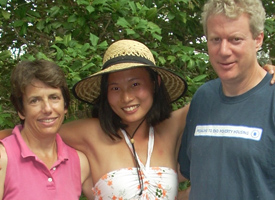
They’ve lived in many places—Europe and Canada, on the West Coast, and in New England—but Arthur and Carol Merten Upshur ’83 have always returned to the southern tip of Virginia’s Eastern Shore, where Upshurs have lived and worked for nearly 400 years.
“This is a longtime dream,” says Arthur of the small organic farm he and Carol created four years ago on a neck of land stretching from the town of Machipongo, Va., into the Chesapeake Bay.
Related Articles
By Elizabeth Redden ’05
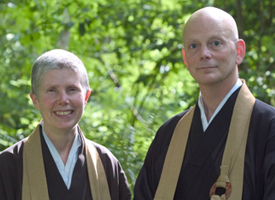
It is not just whether you are hungry, but how. There are seven kinds of hunger, writes Jan Chozen Bays ’66, a pediatrician and Zen teacher, in her recent book, Mindful Eating: A Guide to Rediscovering a Healthy and Joyful Relationship with Food. There is eye hunger, and there is nose hunger, motivated by the visual appeal and aromas of food, respectively; and there is mouth hunger, driven by the tongue’s desire for new sensations or textures. “I call the mouth a cavern of desire,” says Bays. It is never satiated. “Has your tongue ever told you, ‘Stop, stop, I don’t want to eat more?’”
Related Articles
By Rebecca Chopp

SWARTHMORE COLLEGE—as any Swarthmorean knows—is a very distinct community. We are distinct in the clarity of our mission: We teach only undergraduates, and we believe passionately in the power of ideas. We are also distinct in the clarity of our values, which are held firmly and expressed consistently in our practices: respect for the individual, consensus decision making, simple living, generous giving, the peaceful settlement of disputes, and what our Quaker founders called the amelioration of suffering, or what we now describe as setting the world aright and anew.
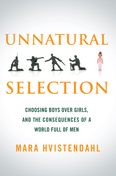
Population control. Masculinization. Communism. Fertility. Human trafficking. Sex selection. Technology. Tradition. Imperialism. Demography. Abortion. Economics. All of these—and more—are brilliantly woven together by Mara Hvistendahl in her compelling exposé about the seemingly disconnected but ultimately intricately interwoven factors that contribute to a world with girls “going missing.”
By William Ehrhart ’73

The weapon that got Ken Takenaga and me was an RPG, a rocket-propelled grenade. You’ve probably seen RPGs in news footage of Afghan mujahedeen or Taliban fighters. The launcher is a long thin tube the gunner rests on his shoulder like a bazooka, and the projectile sticks out the front of the tube like a bulbous cone-shaped piece of nastiness. We didn’t call them RPGs back then. We called them B-40s. But a rose by any other name still has thorns, and whatever you call it, one B-40 can screw up your whole day. It certainly screwed up ours.
 Steering carefully up the rutted driveway, I look to the house for signs of life. It’s just past the dinner hour, a rare moment of pause on a farm in midsummer. The North Country air is cool as I step from the car, and the view is east. Under the blue wash of Vermont’s distant mountains, Essex Farm’s 500 acres spread out lush and green.
Before I can turn around, Mark Guenther Kimball ’94 is bounding out to greet me, no room for doubt in his rapid stride. He is 38 but looks younger, a rangy six-foot-four, grizzled with three days’ beard. “Your timing is perfect,” he says brightly, leading me into the house. Not two minutes later, I’m sitting down to the meal he’s placed before me. It’s a simple supper, chicken and greens and a neighbor’s bread, but the freshness of the food, its plain goodness here in the farmhouse kitchen, is almost shocking after the long trip. As I sit and savor the unexpected bounty, Mark attempts to bring me up to speed.
Steering carefully up the rutted driveway, I look to the house for signs of life. It’s just past the dinner hour, a rare moment of pause on a farm in midsummer. The North Country air is cool as I step from the car, and the view is east. Under the blue wash of Vermont’s distant mountains, Essex Farm’s 500 acres spread out lush and green.
Before I can turn around, Mark Guenther Kimball ’94 is bounding out to greet me, no room for doubt in his rapid stride. He is 38 but looks younger, a rangy six-foot-four, grizzled with three days’ beard. “Your timing is perfect,” he says brightly, leading me into the house. Not two minutes later, I’m sitting down to the meal he’s placed before me. It’s a simple supper, chicken and greens and a neighbor’s bread, but the freshness of the food, its plain goodness here in the farmhouse kitchen, is almost shocking after the long trip. As I sit and savor the unexpected bounty, Mark attempts to bring me up to speed.
 It was a year ago, and the end of my Saturday morning volunteer shift as a cashier at the Community Grocery Co-op, a market in Chester, Pa., a downtrodden post-industrial city of 35,000 people. The Co-op is an experiment in food democracy and sustainable living. Tina Johnson, its director, purchases wholesale fruit and vegetables—much of it locally grown—and, at that time, retailed her goods twice weekly in a jazz club in downtown Chester. It’s the only grocery store in Chester open on a daily basis because the supermarket chains have redlined the city as too great a financial risk.
It was a year ago, and the end of my Saturday morning volunteer shift as a cashier at the Community Grocery Co-op, a market in Chester, Pa., a downtrodden post-industrial city of 35,000 people. The Co-op is an experiment in food democracy and sustainable living. Tina Johnson, its director, purchases wholesale fruit and vegetables—much of it locally grown—and, at that time, retailed her goods twice weekly in a jazz club in downtown Chester. It’s the only grocery store in Chester open on a daily basis because the supermarket chains have redlined the city as too great a financial risk.  They’ve lived in many places—Europe and Canada, on the West Coast, and in New England—but Arthur and Carol Merten Upshur ’83 have always returned to the southern tip of Virginia’s Eastern Shore, where Upshurs have lived and worked for nearly 400 years.
“This is a longtime dream,” says Arthur of the small organic farm he and Carol created four years ago on a neck of land stretching from the town of Machipongo, Va., into the Chesapeake Bay.
They’ve lived in many places—Europe and Canada, on the West Coast, and in New England—but Arthur and Carol Merten Upshur ’83 have always returned to the southern tip of Virginia’s Eastern Shore, where Upshurs have lived and worked for nearly 400 years.
“This is a longtime dream,” says Arthur of the small organic farm he and Carol created four years ago on a neck of land stretching from the town of Machipongo, Va., into the Chesapeake Bay.  It is not just whether you are hungry, but how. There are seven kinds of hunger, writes Jan Chozen Bays ’66, a pediatrician and Zen teacher, in her recent book, Mindful Eating: A Guide to Rediscovering a Healthy and Joyful Relationship with Food. There is eye hunger, and there is nose hunger, motivated by the visual appeal and aromas of food, respectively; and there is mouth hunger, driven by the tongue’s desire for new sensations or textures. “I call the mouth a cavern of desire,” says Bays. It is never satiated. “Has your tongue ever told you, ‘Stop, stop, I don’t want to eat more?’”
It is not just whether you are hungry, but how. There are seven kinds of hunger, writes Jan Chozen Bays ’66, a pediatrician and Zen teacher, in her recent book, Mindful Eating: A Guide to Rediscovering a Healthy and Joyful Relationship with Food. There is eye hunger, and there is nose hunger, motivated by the visual appeal and aromas of food, respectively; and there is mouth hunger, driven by the tongue’s desire for new sensations or textures. “I call the mouth a cavern of desire,” says Bays. It is never satiated. “Has your tongue ever told you, ‘Stop, stop, I don’t want to eat more?’”  SWARTHMORE COLLEGE—as any Swarthmorean knows—is a very distinct community. We are distinct in the clarity of our mission: We teach only undergraduates, and we believe passionately in the power of ideas. We are also distinct in the clarity of our values, which are held firmly and expressed consistently in our practices: respect for the individual, consensus decision making, simple living, generous giving, the peaceful settlement of disputes, and what our Quaker founders called the amelioration of suffering, or what we now describe as setting the world aright and anew.
SWARTHMORE COLLEGE—as any Swarthmorean knows—is a very distinct community. We are distinct in the clarity of our mission: We teach only undergraduates, and we believe passionately in the power of ideas. We are also distinct in the clarity of our values, which are held firmly and expressed consistently in our practices: respect for the individual, consensus decision making, simple living, generous giving, the peaceful settlement of disputes, and what our Quaker founders called the amelioration of suffering, or what we now describe as setting the world aright and anew.

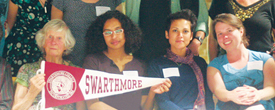
 Population control. Masculinization. Communism. Fertility. Human trafficking. Sex selection. Technology. Tradition. Imperialism. Demography. Abortion. Economics. All of these—and more—are brilliantly woven together by Mara Hvistendahl in her compelling exposé about the seemingly disconnected but ultimately intricately interwoven factors that contribute to a world with girls “going missing.”
Population control. Masculinization. Communism. Fertility. Human trafficking. Sex selection. Technology. Tradition. Imperialism. Demography. Abortion. Economics. All of these—and more—are brilliantly woven together by Mara Hvistendahl in her compelling exposé about the seemingly disconnected but ultimately intricately interwoven factors that contribute to a world with girls “going missing.”
 The weapon that got Ken Takenaga and me was an RPG, a rocket-propelled grenade. You’ve probably seen RPGs in news footage of Afghan mujahedeen or Taliban fighters. The launcher is a long thin tube the gunner rests on his shoulder like a bazooka, and the projectile sticks out the front of the tube like a bulbous cone-shaped piece of nastiness. We didn’t call them RPGs back then. We called them B-40s. But a rose by any other name still has thorns, and whatever you call it, one B-40 can screw up your whole day. It certainly screwed up ours.
The weapon that got Ken Takenaga and me was an RPG, a rocket-propelled grenade. You’ve probably seen RPGs in news footage of Afghan mujahedeen or Taliban fighters. The launcher is a long thin tube the gunner rests on his shoulder like a bazooka, and the projectile sticks out the front of the tube like a bulbous cone-shaped piece of nastiness. We didn’t call them RPGs back then. We called them B-40s. But a rose by any other name still has thorns, and whatever you call it, one B-40 can screw up your whole day. It certainly screwed up ours.
